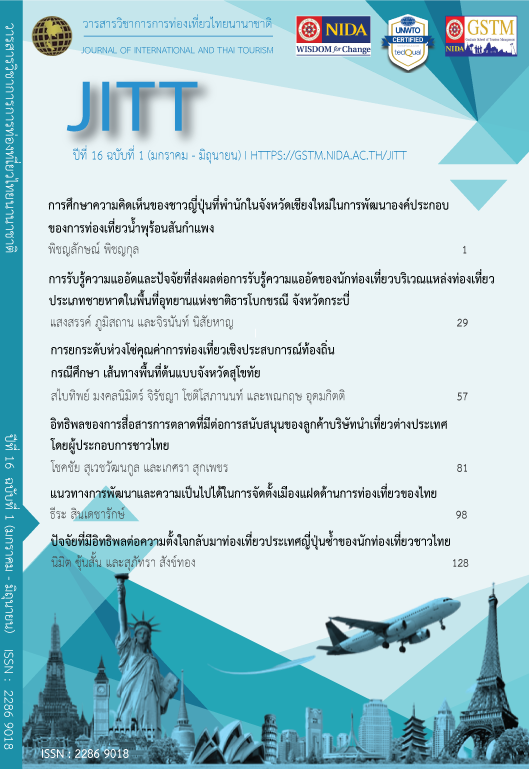การยกระดับห่วงโซ่คุณค่าการท่องเที่ยวเชิงประสบการณ์ท้องถิ่น
Main Article Content
บทคัดย่อ
การวิจัยนี้มีวัตถุประสงค์ในการศึกษา 1) ศึกษาการยกระดับห่วงโซ่คุณค่าการท่องเที่ยวเชิงประสบการณ์ท้องถิ่นของพื้นที่ต้นแบบ 3 เส้นทาง ได้แก่ จังหวัดสุโขทัย จังหวัดชุมพร-ระนอง และจังหวัดสตูล 2) เพื่อจัดทำแนวทางการยกระดับห่วงโซ่คุณค่าการท่องเที่ยวเชิงประสบการณ์ท้องถิ่น ผลการศึกษาพบว่า การยกระดับห่วงโซ่คุณค่าจำเป็นต้องออกแบบคุณค่าที่แต่ละเส้นทางท่องเที่ยวมอบแก่นักท่องเที่ยวก่อนการยกระดับห่วงโซ่คุณค่า เส้นทางท่องเที่ยวจังหวัดสุโขทัย ได้แก่ “ความสุขจากวิถีชีวิตที่ผสานระหว่างอดีตและปัจจุบัน” เส้นทางท่องเที่ยวจังหวัดชุมพร-จังหวัดระนอง ได้แก่ “การพักผ่อน การท่องเที่ยวแบบเนิบช้า ดื่มด่ำบรรยากาศ” เส้นทางท่องเที่ยวจังหวัดสตูล ได้แก่ “ประสบการณ์ Geopark และการท่องเที่ยววิถีมุสลิม” การออกแบบกิจกรรมต้องมุ่งเน้นในการส่งเสริม รักษา คุณค่าที่มอบให้แก่นักท่องเที่ยวที่ได้กำหนดไว้ ข้อเสนอแนะต่อการยกระดับห่วงโซ่คุณค่าการท่องเที่ยวประสบการณ์ท้องถิ่น ได้แก่ 1) การพัฒนาผลิตภัณฑ์/บริการ เพื่อให้สามารถตั้งราคาสูงขึ้น ได้แก่ การสร้างประสบการณ์ท้องถิ่น การท่องเที่ยวอย่างรับผิดชอบ การจัดการความปลอดภัย 2) ความร่วมมือในแนวนอน (Horizontal Coordination) และ 3) ความร่วมมือในแนวดิ่ง (Vertical Coordination)
Article Details
เอกสารอ้างอิง
Brand Matrix Research (2017). The study of foreign tourist trends and behavior of niche market: Local Experience. Bangkok: Tourism Authority of Thailand.
Department of Tourism. (2018). Tourism receipts from international tourist arrivals. Retrieved January 30, 2019, from https://www.mots.go.th/old/more_news.php?cid=529&filename=index.
Expedia group Media Solutions. (2018). Five Trends That Will Shape Experiential Travel in 2019. Retrieved August 08, 2018, from https://skift.com/2018/11/06/five-trends-that-will-shape-experiential-travel-in-2019.
Kantabutra, S., Saiprasert, W., Chernbumroong, S. and Kowsuvon, K. (2019). Comparison of Foreign Tourists’ Motivation Factors: Does cultural background matter? Journal of International and Thai Tourism, 15 (1), 84-102.
Netherlands Development Organization. (2010). Value Chain Development for Tourism Destinations. Retrieved August 25, 2018, from http://www.hitt-initiative.org/wp/wp-content/uploads/2011/11/GHTDP-VCD-Guidelines.pdf.
Pine, J. and Gilmore, J.H. 1999. Welcome to the Experience Economy. Harvard Business Review. July-August 1998, 97-105.
Porter, M. E. (2004). Competitive Advantage: Creating and Sustaining Superior Performance. New York: Simon & Schuster.
Royal Institute Dictionary. (2019). Retrieved August 02, 2017, from http://www.royin.go.th/dictionary/.
Responsible Tourism Partnership. (2019). What is Responsible Tourism? ค้นเมื่อ 17 เมษายน 2562. จาก https://responsibletourismpartnership.org/what-is-responsible-tourism/.
Stamboulis, Y. and Skayannis, P. (2003). Innovation Strategies and technology for experience-based tourism. Tourism Management, 24 (1), 35-43.
Tourism Authority of Thailand. (2016a). Meeting Documents of The LINK Project, October 2016 in Bangkok.
. (2016b). Localism and Staycation. TAT Review, 2 (3), Jul-Sep 2016. Retrieved June 25, 2017, from https://etatjournal.files.wordpress.com/2016/07/tat32016.pdf.
UNECA. (2014). Up-grading and Enhancing Sustainable Linkages of Rwanda’s Tourism Value Chains. Ethiopia: UNECA.
UNWTO. (2018). UNWTO Tourism Highlights 2018 Edition. Retrieved January 30, 2019, from https://www.e-unwto.org/doi/pdf/10.18111/9789284419876.
Wongsaroj, R. (2018). The Guidelines for Carry Capacity and Revenue Enhancement at Tourist Destinations. Journal of International and Thai Tourism, 14 (2), 62 - 75.


